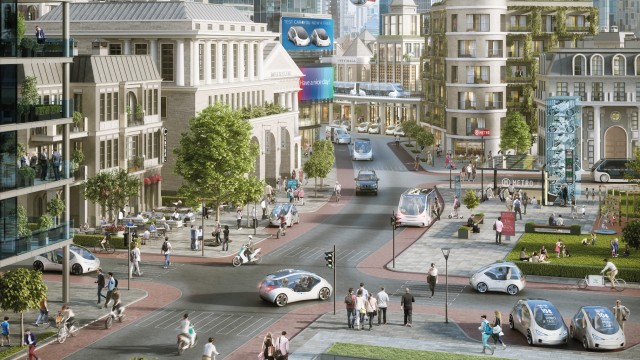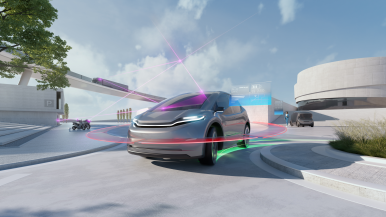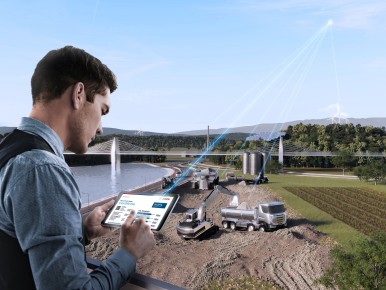Coup: Bosch already offers mobility services for large cities. The Coup e-scooter sharing service is one example. After debuting in Berlin, it has now been launched in Paris. Bosch has put 1,600 e-scooters on the road – and more are on the way. Anyone 21 years of age or older with an international or EU category B driver’s license can use this service. The Coup app enables users to find, reserve, and pay for the nearest e-scooter and then simply ride away on it – all without a key. A helmet and two charged batteries are stored under the seat. Coup makes sure the batteries are always charged so that customers do not have to worry about anything. Powered by electricity from renewable sources, the e-scooters can travel as fast as 45 kph. Users can park them in specially designated zones within Coup’s area of operations.
Multimodal: In July 2017, Bosch launched the test phase for a mobility assistant that analyzes real-time data to find the quickest route through a city. This app guides commuters to their destinations efficiently, allows cities to regulate traffic volumes, and enables mobility providers to enhance utilization of their various means of transport.
Connected parking: Step by step, Bosch projects are helping take the stress out of the search for parking. At present, this search accounts for one-third of urban traffic. Whether community-based parking, active parking lot management, or automated valet parking – Bosch solutions for connected and automated parking save time and fuel, and spare people’s nerves.
Finding a parking space: Bosch community-based parking simplifies the search for a suitable space. Using the ultrasonic sensors of their parking assist system, cars identify and measure the gaps between parked cars as they drive past them. The data gathered is transferred in real time to a digital parking-space map that can help guide drivers to available spaces. Together with Mercedes-Benz and other manufacturers, Bosch is testing this service in cities across Germany and elsewhere in Europe. This system is to be expanded so that drivers can pay parking fees digitally.
Connected cars: By 2025, connectivity will have clearly changed driving for everybody. Connected functions will save almost 400,000 metric tons of CO₂ – as much as one major German national park can capture and store in three years. Strategies such as community-based parking and active parking-space management can reduce the number of kilometers driven in search of parking spaces by 480 million, while highly automated driving can also save fuel.
RDE: This year will see the first-time certification of diesel models that comply with the Euro 6 standards for real driving emissions, or RDE. Bosch is currently pursuing some 300 RDE projects with its customers. The company wants to support automakers in their efforts to make nitrogen-oxide driving emissions from diesel vehicles even lower. In urban test drives, Bosch has already shown this is possible.
Particulate filters: In Europe, Bosch will no longer be carrying out engineering work for spark-ignition engines that are not fitted with a particulate filter. Such filters have helped significantly reduce the particulate emissions of diesel engines, and this is now a goal for gasoline engines as well.
48-volt drive system for light electric vehicles: Bosch has developed a finely tuned 48-volt drive system – comprising a motor, control unit, battery, charger, display, and app – that is ideal for urban mobility. This drive system makes for efficient urban mobility and, thanks to its rapid acceleration from a standstill, for greater driving enjoyment. Whether two, three, or four wheels, this system is available for all classes of light electric vehicles. As it is made up of off-the-shelf automotive components, manufacturers will have the benefit of production-tested parts and minimal development expense. This gives both established OEMs and new players in the market the opportunity to launch vehicles within 12 to 18 months.
Final mile: Bosch electromobility is already in evidence in German urban delivery traffic. Bosch supplies the powertrain system for the German Post Office’s Streetscooters. This is Europe’s largest electric-vehicle fleet.
Keeping Bosch associates mobile no matter what: All Bosch locations in the Stuttgart metropolitan area rely on public transportation on days when particulate-pollution warnings are issued. In such cases, Bosch associates who work in Stuttgart can use their company ID as a ticket for work-related trips by public transportation. This special arrangement between the transportation authorities in Stuttgart and Bosch is yet another mobility solution the supplier of technology and services offers its workforce. It also allows Bosch to support the city’s efforts to combat particulate pollution.





